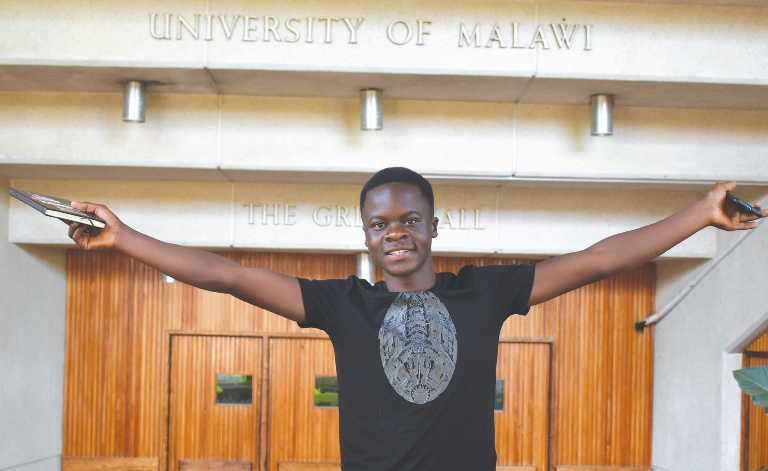In 2020, Medson Kayuni nearly dropped out of school as his parents struggled to pay his tuition at Mhuju Community Day Secondary School (CDSS) in Rumphi.
The nightmare struck the hardest shortly after he had been selected to the nearest secondary school worth K15 000 every three months.
Medson at Chancellor College
“My parents were happy when I made it to secondary school, but they were also visibly worried about the financial burden ahead. They were already struggling to feed us from one harvesting season to the next,” recalls the 18-year-old, who has become a symbol of triumph over adversity.
On August 7 this year, he made his first trip beyond the hilly district. The nighttime bus took him to Zomba where he is studying for a degree in social science at the University of Malawi (Unima).
The trip personifies how the nationwide Social Cash Transfer Programme protects the well-being families in poverty, including children’s dreams. Under the Social Support for Resilient Livelihoods Project funded by the World Bank, the programme supports147 000 households, including 4 600 beneficiaries in Rumphi. The five-year social protection project targets poor and vulnerable households, including the labour-constrained.
Medson recounts: “On arrival at Unima, I closed my eyes in joy and disbelief because this was my first trip beyond the Northern Region.
“I asked myself: ‘Is this really you, Med?’ Without the monthly cash transfer my family receives every month, I would have dropped out in secondary school.”
Every month, Medson’s family receives social cash transfers conceived to protect vulnerable households from poverty, hunger and inequality.
Thanks to the social protection initiative, Medison stopped escorting his parents to low-paying piecework in well-off neighbours’ fields while his peers were studying or doing homework.
“Back home, life wasn’t easy,” he says. “I lacked pens, notebooks, school uniforms and other basics. My parents spent months working in neighbours’ fields, leaving our own idle,” he says.
The first-year student likes mathematics and geography. He was one of the three learners selected from Mhuju to public universities.
He has reunited with Chenjerani Harawa, his boyhood friend from Lubagha CDSS near his village.
“I like Chenjerani and we encourage each other not to relent. For both of us, education is the only trusted weapon against poverty which almost killed our dreams,” he explains.
Medson aspires for a statistical job that will help his life and family.
“I want to change my life together with my family and village so every child can go to school and dare to bream big,” he states, smiling.
Equally excited and optimistic are his mother Fanny Mushani, 46, and father Augustine Kayuni, 52.
Medson has become their first child in a family of three sons and three girls to step in the corridors of a university. His siblings quit school due to poverty.
“Medson is our pride and only hope. We are delighted with his success. Most of his peers who don’t make it to university end up smoking and drinking senselessly as poverty bites harder,” says the mother of six.
The family, which receives K11 500 a month, used the social cash transfers to build a grass-thatched brick house furnished with two beds, wooden chairs and mattresses.
The couple also used the cash-outs to pay school fees for their children and bought a pig which has raised three piglets. They rent out a boar in exchange for one piglet. They sell the young pigs for “fast cash”.
“Just before Medison went to university, we sold two pigs, one at K55 000 and the bigger at K60 000. We used the money to buy him a bag, a blanket, a mobile phone and soap as well as paying his bus fare and rentals off campus,” Mushani explains.
Kayuni is confident that his son will seize the opportunity to rewrite history.
“Even children in poverty have a right to learn. Education is everything because it helps them break the chains of poverty. I hope Medson won’t be distracted. Our son is disciplined and focused to achieve his dreams,” he says.
The Kayunis supplement the social cash transfers with livestock and fish sales in their rural locality under Traditional Authority Mwahenga.
They urge social cash transfer beneficiaries to use cash-outs wisely to avoid sliding into worse poverty.
The family plans to buy iron sheets for their home, but not before Medson gets his first degree.
“Medson is a blessing to us. Every day, we pray for his well-being and success because many children look up to him as a role model. No child should quit school too young because they think it is a waste of time,” says the boy’s father.
And Medson says he has no reason to fail.
“I work hard in college because I owe it to my humble beginnings, my siblings who didn’t have this chance in life, my parents who supported me to get here and my peers who look up to me as a living examples.”
The post From uncertainty to university appeared first on The Nation Online.
 Moni Malawi
Moni Malawi 

